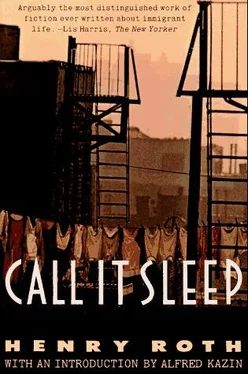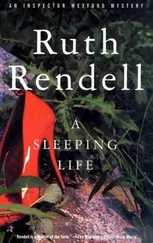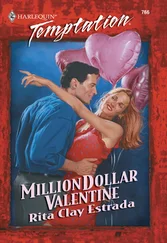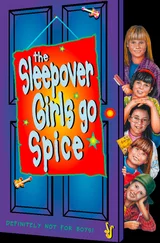“Yes! Blood!” He rapped out, slamming the door. “Have you never seen it? First that idiot barks from the window at my approach! Now you! Lament! Lament! Bring all your neighbors in here cackling!”
“Oh, Albert! Albert!” She swayed back and forth. “What is it? What’s happened?” The tears braided on her cheek-bones.
“You always were a fool!” he growled. “You see me alive! Will you stop it!”
“Tell me! Tell me!” Her voice dwindled with anguish. “Tell me—! What have you — done? I — alas! before I—”
“Done? Me?”
“What! Tell me!” She was breathing thickly “Hurry!”
“You’re not far from wrong!” he snarled. “You’ve almost guessed it! Yes! I would have done, but that cursed press ground me first! Anh! That press saved him! He doesn’t know it! I would have — What!”
With a whispered groan her head sank. She stumbled toward a chair, dropped into it, slumped, her limp arms hanging beside her. At the sight of her awful pallor David burst into tears.
“Bah!” his father scoffed angrily. “In God’s name I thought you had more wisdom.” He strode to the sink, filled up a glass of water, pried it between her lips. The water runneled her chin, spattered on her dress. “And you’re the one to faint!” he snorted bitterly.
“I’m all right!” she said weakly, lifting her head. “I’m all right, Albert. But — but you didn’t strike him!”
“No!” savagely. “I told you I didn’t! He escaped. Are you more worried about him than about me? Is that it?”
“No! No!”
“Then what are you fainting for? It’s only my thumb. The jaws of the press! I wasn’t quick enough! It jammed, that’s all. You didn’t take on this way when I caught the nail of that finger, did you?”
She hissed, wincing.
“I’ve still got it with me — my thumb — if that’s what’s troubling you. If you hadn’t deafened me with your clamor I could have told you sooner! Now help me off with my coat — or are you still too weak?”
She rose unsteadily, took hold of his coat-collar.
“Curse him!” he muttered squirming free slowly. “The treacherous dog! God’s flame make a candle of him! You don’t have any more privileges than any one else! That’s what he said to me before this — Unh!” He groaned between his teeth as the sleeve slid over his injured hand. “I shouldn’t have let — the jacket — go with it.”
“Is it so bad, Albert!” She put out her hand. “I didn’t mean to—”
“Stop coming at me that way, will you! I don’t need support!”
He stared at the bandage which now that his coat was off seemed to David’s tear-blurred eyes to have swollen to twice its bulk.
“He didn’t have to cover the fingers too, the fool!” He dropped into a chair, masked his eyes with his bony hand. It was heavily ink-blacked, unwashed. “Doctors! They’d rather use the whole ribbon than bother cutting it. And why not? They won’t have to carry it around.” His head dropped back.
“Can I give you anything? Coffee? We still have some wine left.”
“No,” wearily. “I’ll be drowsy soon without wine. I’ll sleep well.” He hooked the heel of his dull black shoe on the lowest rung of the chair, grunted as he stooped down.
“Let me!” She started forward.
He waved her back. “One hand is enough!” And pulling the buttons open. “The angel of Fate strikes always on the side you never guard. I thought that before that dog saw the last of me, I’d make him writhe. And I would have!” His teeth grated. “There was enough venom in me to finish a score of Luters. But they led me out like a sheep.” He kicked his shoe off, watched it roll over on its side, dully. “But you can’t think too much when you’re feeding a press. You can’t dwell too much on the one you hate. That’s the foreman’s privilege. His hands are free!” He shook his foot loose from the other shoe. “Anh! But he was pale when they led me into the bosses’ office. He must have seen what was in my eyes. He must have known who was to blame. And I had one good hand left. Or maybe it was the blood he couldn’t bear. I left it on their carpets.”
She had been watching him rigidly. And when he stopped speaking a tremor ran through her. “Did — did the doctor say anything? Will it heal soon?”
He shrugged. “It won’t have anything else to do. I can’t use it for weeks — at least, that’s what he said. It’s well munched.”
She groaned.
“They spoke of paying me something for the time I was out. Of their own free will they offered it. I don’t know why. But much they’ll give me. Tomorrow I see them again and the doct — tomorrow!” He caught his breath loudly. “Tomorrow is Thursday!”
His lips swelled out in hatred, his eyes burned savagely. Both David and his mother stared at him in fascinated terror.
“Curse him and his gifts!” he suddenly snarled. “May he burn with them! God bray him into bits!”
His right elbow moved downward, but the sling checked his hand. With writhing lips, he reached his left hand behind his back, fumbled in the right rear pocket and drew out his black leather pocket-book.
“Curse him!”
He drew out a small slip of white paper, the theatre-pass, crumpled it in grinding fingers to a crackling wad and threw it down on the table.
“Nothing fulfills itself with me! It’s all doomed! But what made him give me this? And what made him change? If I only knew! If I only knew!” His left hand drummed on the table.
There was a horrible silence while they stared at the wad of paper on the table. Then his father slipped the bandaged hand free from the sling and began slowly stretching it back and forth to flex the cramped and clicking elbow. His face wore an expression of grim aloofness as though it were not his own hand he was experimenting with but someone else’s. On his mother’s features horror and pity were written. David gazed from one to the other and finally like theirs his eyes came to rest on the hand that had just settled softly on the table, glimmering and peninsular on the green oilcloth. Minutes seemed to pass in a dull dragging vacancy in which no word was spoken. David looked up. His mother’s face was unchanged as though that anguished look were caught in stone. But his father’s face had become flushed, relaxed; the deep breath hissed softly at his nostrils. His eyelids had begun to linger at their shutting, opening not in one but in two stages. He spoke. Faint ratchets of effort against drowsiness and fatigue ticked and caught in his voice, thickening it. And as though to himself—
“I’ll never go back to work there again. I’ll never go back to printing at all. I’m through. Whatever work I do hereafter, it’s going to be out doors — alone if I can. But out doors always … I’ll not let myself be hemmed in by ink and iron any more. I don’t want any foremen for my friends. I don’t want anybody. I–I have no fortune with men.”
He sighed harshly, rose and yawned as if he were groaning. The bandaged hand stretched ceilingward, and when he brought it down into the sling again, one eye shut in pain—
“It’s as though it were hollow.” He turned toward the front room, eyed David a moment and went up.
“I’ll get you a quilt,” she trailed him.
He made no answer and both climbed up the front room stairs.
Sitting in numb silence beside the window, David stared after them, watched them disappear, listened. The bed creaked. In a few moments, he heard his mother’s quick tread and then the slither of something dragged from the couch — the quilt. And then the bedroom was closed and he heard only the ticking of the clock. The strange start of dread he had felt when his father’s eyes had rested on him still lingered with him. He had seen it before — that look, that flicker of veiled suspicion more frightening than wrath — had seen it almost always the day his father had thrown up a job. Why? What had he done? He didn’t know. He didn’t even want to know. It frightened him too much. Everything he knew frightened him. Why did he have to be here when his father came home? Why had his mother kept him? Why did he have to know? You had to know everything and suddenly what you knew became something else. You forgot why, but it was something else just the same. Scaring you—
Читать дальше












